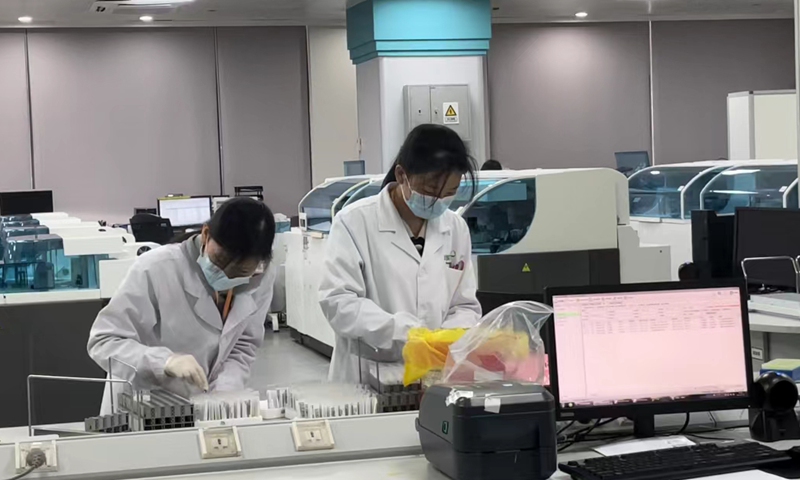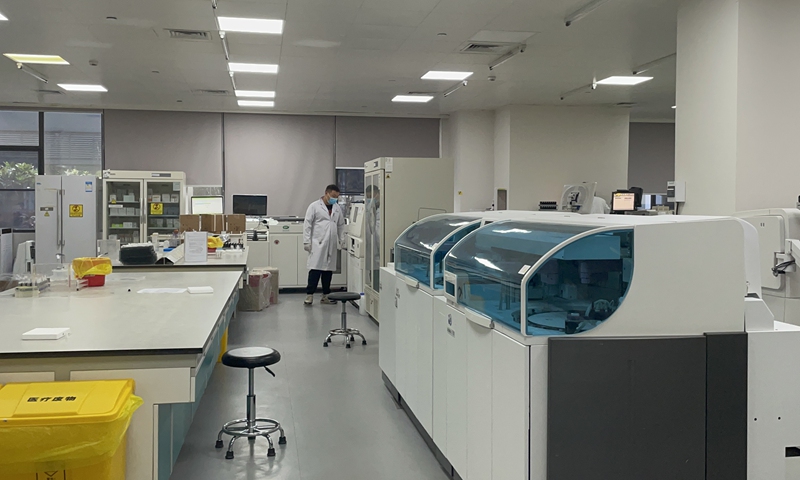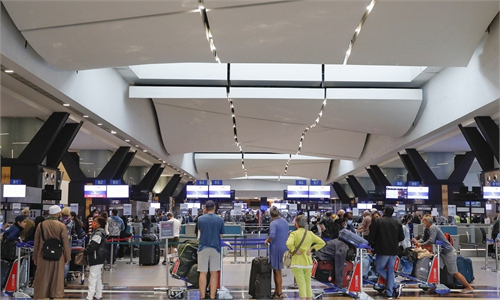
The Global Times reporters visit the lab of the headquarter of KingMed Diagnostics in Guangzhou, South China's Guangdong Province, which claimed to be the largest independent clinical testing laboratory in China.Photo:Liu Caiyu/GT
As the fight against the COVID-19 epidemic has entered a stage of normalization, nucleic acid testing has become an essential part of life, allowing people in China to travel around freely. It is also a key measure for epidemic-affected regions to control viral transmission.
How is China able to test so many people? To find out, Global Times reporters visited the headquarters of KingMed Diagnostics in Guangzhou, South China's Guangdong Province, which claims to be the largest independent clinical testing laboratory in China.
Wang Linglai, deputy chief executive at KingMed, told the Global Times that since 2020, the company has been shouldering nucleic acid testing for the COVID-19 epidemic in Wuhan and has been one of the leading forces to support the resumption of business and schools across the country.
Carrying out timely nucleic acid testing is one of the key measures for China's dynamic zero-case policy, which stresses "Four-Early" measures: early detection, early reporting, early quarantine, and early treatment of COVID-19 cases.
Through technological improvement and optimization, the daily testing amount has been increased by 10 times, and it has successively supported nucleic acid testing in 31 provinces and the Hong Kong and Macao Special Administrative Regions. By October this year, the company had tested more than 190 million people and the daily nucleic acid testing capacity surpassed 1.3 million, ranking first in the world, Wang said.

The Global Times reporters visit the lab of the headquarter of KingMed Diagnostics in Guangzhou, South China's Guangdong Province, which claimed to be the largest independent clinical testing laboratory in China.Photo:Liu Caiyu/GT
In Guangzhou, the Global Times visited the company's newly developed mobile lab which can perform up to 30,000 tests per day, five times higher than traditional labs.
According to lab manager Zhao Guiyun, unlike a traditional container lab, which takes hours to install, the new lab uses hydraulic lifts to load and unload itself in just over ten minutes, without the need for external tools such as cranes.
"The movable lab can be placed near nucleic acid testing sites and narrow down the distance of transporting tubes and increase the efficiency," Zhao told the Global Times. "It only takes 45 minutes to get a result in emergency situations."
KingMed is also one of the independent testing institutes recognized by the Hong Kong SAR government since July 2020. In the past six months, it has tested more than 3 million people and its daily nucleic acid testing capacity can be quickly increased to 50,000 tubes as needed, making it one of the local laboratories with the highest daily nucleic acid testing capacity.
KingMed also entered southwest China's Xizang Autonomous Region in April 2021, making it the first third-party medical testing center in Xizang. This means people in the region can share the same medical testing services as those in developed regions.
The medical testing center has established 38 provincial-level central laboratories and more than 600 regional laboratories in all provinces and regions except the island of Taiwan, covering more than 90 percent of the Chinese population.
It also provides door-to-door service for grassroots townships and communities, offering service to more than 23,000 medical institutions at all levels and 900,000 clinicians.
Wang said that KingMed benefits from policy support from Guangzhou. Based on laboratories in Guangzhou, Shenzhen, Hong Kong and Macao, KingMed has offered testing services for more than 1,900 medical institutions in the Greater Bay Area. Taking Hong Kong as the bridgehead, its service could also extend to Southeast Asia, serving countries and regions along the "Belt and Road," such as Malaysia and Iran.
The visit to the KingMed is part of the themed activity of "Sharing the same heart with Guangdong, Hong Kong and Macao; Joining hands with the Greater Bay Area" held by the Cyberspace Administration of China.



